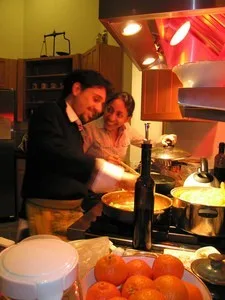
What a difference a statistic makes.
I thought most folks who spend hours watching cooking shows like Top Chef, Hell’s Kitchen, Iron Chef, The Next Food Network Star (okay, all the shows on the Food Network) are culinary energized by these shows and head to their kitchens the next weekend to try and make some of the food.
Or they take the tips and recipes in the plethora of food magazines and from the seemingly endless number of food and cooking websites and try to work their magic for the family dinner.
Then I read Michael Pollan’s article in the New York Times Magazine from a few weeks ago entitled, Out of the Kitchen, On to the Couch (I know, I’m behind in my reading).
In it, the author of the bestselling In Defense of Food, An Eater’s Manifesto uses the movie Julie & Julia as a peg to discuss the current state of food and cooking in America.
Before I even finish the first page, he turns my philosophy upside down by explaining how the all these food shows have actually helped turn cooking from a participation activity into a spectator sport!
And then he hits me with the statistic.
In paragraph 9:
Today the average American spends a mere 27 minutes a day on food preparation… less than half the time it takes to watch a single episode of “Top Chef” or “Chopped” or “The Next Food Network Star.
– Source
What? That’s it? What happened?
Pollan’s article is a thoughtful piece tracking cooking TV and American culture from Julia Child’s The French Chef and its influence on cooking in the home kitchen to cultural shifts in America and the way we eat that moved us to celebrity chefs cooking in Kitchen Stadium while we eat prepared food and watch from the couch.
So in the end, my theory that the current focus on food in media translated to the home kitchens of America is wrong. At least for the nation as a whole.
I still believe for a decent-sized niche it has had the opposite effect — introducing people who grew up in homes where cooking skills weren’t honed to food and cooking, and inspiring them to learn more and do more.
And for a larger population, it has at least educated them about food, even if doing nothing more than introducing them to flavor profiles, defining deglaze, and maybe letting them know their blender can be used for something other than margaritas.



